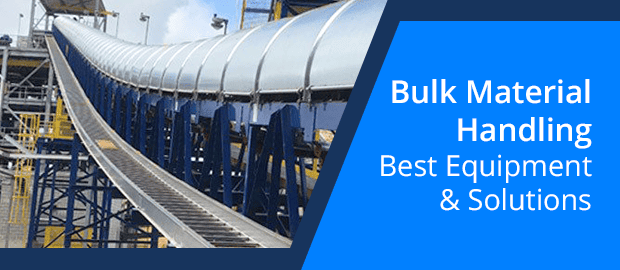Optimize Your Operations with Our Bulk Material Handling Solutions
A] What is Bulk Material Handling?
In bulk material handling, mechanical equipment is used to transfer bulk materials to different units and/or to store and pack bulk materials in varied boxes (octa bins), containers, rigid bins, or super sacks. Bulk material handling equipment is a vital part of all industries that process dry bulk ingredients, and some of the bulk materials that are transferred through this equipment include pellets, powders, flakes, and granules. The bulk process equipment is handy for industries that manufacture plastics, polymers, metal, rubber, food & beverages, tobacco, cosmetic, ceramic, consumer home products, mining, paper, animal feeds, paint, mineral, pigment, metal, textile, agricultural chemicals, among others. The different types of bulk material handling systems are distinguished based on the type of application for which they are used and/or the kinds of materials they are specifically constructed to handle.B] How Does Bulk Material Handling Systems Work?
When it comes to bulk material handling, having a planned system in place will ensure that bulk materials are transported quickly and seamlessly without any undue hassle. The process is quite simple:- Raw materials are received to the facility via bags, drums, trucks, trains or ships.
- Upon arrival, they are unloaded using a conveyor system and stored in stockpiles or a storage facility.
- Next, to reclaim the raw materials from the stockpile, equipment such as automatic reclaimers or gravity-reclaimer or reclaimer with tunnel hoppers and feeders are used.
C] Benefits of Using Bulk Material Handling Systems
- Reduces manual labour and costs: Since fewer workers are required to execute a given task, bulk material handling equipment helps reduce manpower, which results in reduces labour costs.
- Inventory management: This system offers greater control and accuracy, which, in turn, ensures that there is no issue with misplaced items, damages, or other unnecessary problems.
- Doubles productivity: As an automated system, bulk material handling equipment can work non-stop compared to humans. This helps maximize productivity.
- Enhance safety: Compared to manual material moving equipment, automated bulk material handling equipment helps minimize the risk of injuries, which helps enhance workers’ safety in the workplace.
Optimize Your Operations with Our Bulk Material Handling Solutions
D] Types of Bulk Material Handling Systems
1. Storage Equipment
A storage and handling equipment is used to hold or store bulk materials in between receiving and shipping materials. They are designed to utilise the vertical space in the warehouse and typically includes racks, shelves, silos, drawers, hoppers, bins, stacking frames, and mezzanines. The right storage and handling equipment can help boost production efficiency and maximize space utilisation. Also, a manufacturer may require storage equipment to safely store materials, especially during downtimes or to hold materials if they want to build up stocks.2. Engineered Systems
Engineered system for transportation and storage of bulk material includes several types.- Conveyor Systems: These engineered systems are available in different varieties based on the materials that need to be transported. The different types of bulk material handling conveyors include vertical conveyors, overhead conveyors, chain conveyors, vibrating conveyors, and apron conveyors.
- Automated Storage & Retrieval Systems: Accessible by a shuttle system of retrieval, these are large automated organisational engineered systems. The shuttle system can be fully automated or manually operated to find the stored item’s location and to retrieve it speedily for other uses.
- Automatic Guided Vehicles (AGV): AGVs are autonomous computer-operated robots. They are designed to transport bulk materials around a manufacturing facility and use lasers, vision, or magnets for navigation. The best part, to prevent them from colliding with anything in their predetermined path, AGVs are fitted with detectors and sensors.
- Robotic Delivery Systems: Similar to AGVs, this type of engineered system are used to transport goods throughout a warehouse or plant. It can also be used to move products on an assembly line.
3. Packing Equipment
This type of material handling equipment is often used at the end of the production process for bulk packing of materials. The packing equipment helps saves labour costs and facilitates faster filling of bulk materials in multiple containers. It also helps increase safety and boost the efficiency of the packing process. Plus, it ensures a dust-free environment making it an ideal system for swift packaging. The packing equipment is well-suited to fill boxes, drums, totes, and bulk bags.4. Powered Industrial Trucks
One of the best examples of powered industrial trucks is Forklifts. Powered industrial trucks are vehicles or equipment that help move bulk material around the manufacturing or processing floor. This equipment can be automatic or operated manually by workers. Automated Guided Vehicles also fall in this category.- Hand trucks: These are L-shaped devices with handles at one end, wheels at the base, and a ledge to set objects on. Hand trucks are also called dollies or box cart and simple to use.
- Side-loaders: This equipment is well-suited to load materials in a narrow aisle where the movement of a truck may be restricted. They are similar to a forklift and used to load & unload materials from the side of the machine.
- Pallet trucks: : These are industrial forklifts that slide under pallets to move them. Pallet trucks can either be manually operated or automated.
- Platform trucks: Similar to hand trucks, the only difference is that platform trucks come with an extended deck.
- Forklifts: These are operational vehicles used to load and unload heavy items from/to delivery trucks.
- Order Pickers: These vehicles are used to lift a worker off the ground, to place/remove items from higher places.
Optimize Your Operations with Our Bulk Material Handling Solutions
How We Can Help?
Macawber Engineering has vast industry experience in providing custom equipment and handling systems for bulk materials. They are designed to withstand rugged handling in demanding conditions and known for their longevity. To design a seamless bulk material handling system we take into consideration various factors:- Material characteristics: Bulk density, material temperature & fragility, moisture content, angle of repose, particle size distribution, and other special requirements (toxicity, corrosiveness, etc)
- Site/design specifications: Height and length of the equipment, intended capacity, spatial constraints, environmental factors, and other required accessories – service platforms, belt skirts, walkways, etc.
Frequently Asked Questions on Bulk Material Handling
Bulk material handling systems involve the movement, storage, and processing of dry materials such as powders, pellets, and granules. These systems are widely used in industries like plastics, food, pharmaceuticals, cement, chemicals, and metallurgy. They help in safe, efficient, and large-scale operations, making them indispensable to process-driven businesses. If you are wondering what is bulk material handling equipment, it usually includes storage, transfer, and transport machines designed for high-volume efficiency.
Bulk materials can arrive via trucks, ships, or bags. Once received, they are unloaded and stored in silos, bins, or stockpiles. From there, reclaiming equipment like conveyors or feeders transfers them smoothly to the next stage. Finally, the bulk material handling solutions ensure continuous feeding into processing units. This seamless flow keeps production efficient while minimising downtime. For industries that require dust-free, precise transfer, advanced options like a pneumatic conveying system are often used.
Automating these systems offers multiple benefits:
- • Lower labour costs and reduced dependency on manual handling
- • Improved accuracy in storage and inventory tracking
- • Safer operations, especially for heavy or hazardous materials
- • Higher productivity with round-the-clock reliability
Automation also ensures compliance with safety standards while improving workplace efficiency. For example, solutions like pneumatic conveying in the foundry industry: efficiency and cleanliness in bulk material handling highlight how automation improves both safety and cleanliness in demanding environments.
There are different types of bulk material handling equipment, each serving a specific role:
- Storage: Silos, hoppers, and bins
- Movement: Conveyors, AGVs, and robotic systems
- Packaging: Automatic packing and filling machines
- Transport: Forklifts, pallet trucks, and platform trucks
Choosing the right set of equipment is essential, and partnering with experienced bulk material handling equipment manufacturers in India ensures reliable performance tailored to your operation.
Macawber doesn’t believe in one-size-fits-all. Each project begins with a deep analysis of material properties such as bulk density, abrasiveness, fragility, and moisture content. Site-specific conditions, like available space, environment, and capacity requirements, are also considered.
Every solution is then engineered with precision and supported by after-sales services, including maintenance, retrofits, and spare parts. With more than 45 years of experience, Macawber India stands out among leading bulk material handling equipment manufacturers in India by offering long-term, efficient, and reliable bulk material handling solutions across industries.

Kedar Kamath
Kedar Kamath is a highly accomplished bulk material handling professional with 14+ years of experience at Macawber Engineering Systems India Pvt Ltd. Starting as a junior sales engineer, he progressed to his current role heading Business Development and Sales. His expertise encompasses proposals, estimations, sales, marketing, design engineering, project execution, and factory operations. Mentored by industry leaders, Kedar's technical acumen (B.Tech in Electrical Engineering, VJTI, Mumbai) and innovative approach deliver tailored solutions. He's passionate about sustainable practices and driving excellence within the industry.


